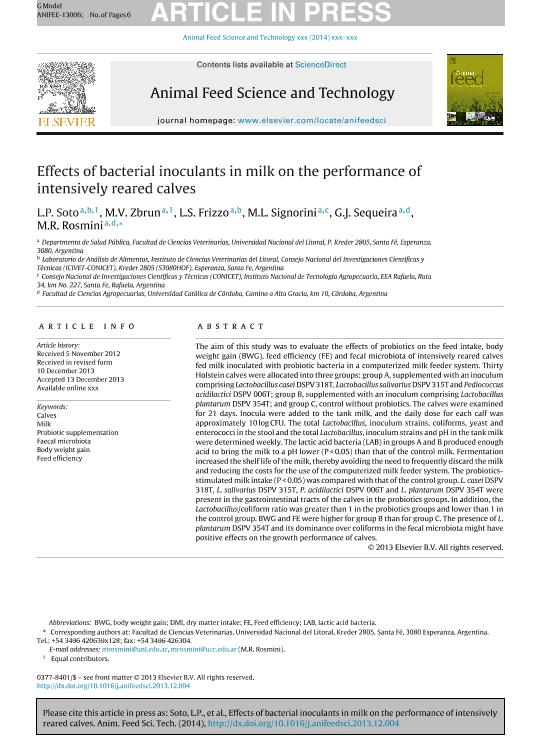Artículo
Effects of bacterial inoculants in milk on the performance of intensively reared calves
Soto, Lorena Paola ; Zbrun, María Virginia
; Zbrun, María Virginia ; Frizzo, Laureano Sebastian
; Frizzo, Laureano Sebastian ; Signorini Porchietto, Marcelo Lisandro
; Signorini Porchietto, Marcelo Lisandro ; Sequeira, Gabriel Jorge; Rosmini, Marcelo Raul
; Sequeira, Gabriel Jorge; Rosmini, Marcelo Raul
 ; Zbrun, María Virginia
; Zbrun, María Virginia ; Frizzo, Laureano Sebastian
; Frizzo, Laureano Sebastian ; Signorini Porchietto, Marcelo Lisandro
; Signorini Porchietto, Marcelo Lisandro ; Sequeira, Gabriel Jorge; Rosmini, Marcelo Raul
; Sequeira, Gabriel Jorge; Rosmini, Marcelo Raul
Fecha de publicación:
12/2013
Editorial:
Elsevier
Revista:
Animal Feed Science and Technology
ISSN:
0377-8401
Idioma:
Inglés
Tipo de recurso:
Artículo publicado
Clasificación temática:
Resumen
The aim of this study was to evaluate the effects of probiotics on the feed intake, body weight gain (BWG), feed efficiency (FE) and fecal microbiota of intensively reared calves fed milk inoculated with probiotic bacteria in a computerized milk feeder system. Thirty Holstein calves were allocated into three groups: group A, supplemented with an inoculum comprising Lactobacillus casei DSPV 318T, Lactobacillus salivarius DSPV 315T and Pediococcus acidilactici DSPV 006T; group B, supplemented with an inoculum comprising Lactobacillus plantarum DSPV 354T; and group C, control without probiotics. The calves were examined for 21 days. Inocula were added to the tank milk, and the daily dose for each calf was approximately 10 log CFU. The total Lactobacillus, inoculum strains, coliforms, yeast and enterococci in the stool and the total Lactobacillus, inoculum strains and pH in the tank milk were determined weekly. The lactic acid bacteria (LAB) in groups A and B produced enough acid to bring the milk to a pH lower (P < 0.05) than that of the control milk. Fermentation increased the shelf life of the milk, thereby avoiding the need to frequently discard the milk and reducing the costs for the use of the computerized milk feeder system. The probiotics-stimulated milk intake (P < 0.05) was compared with that of the control group. L. casei DSPV 318T, L. salivarius DSPV 315T, P. acidilactici DSPV 006T and L. plantarum DSPV 354T were present in the gastrointestinal tracts of the calves in the probiotics groups. In addition, the Lactobacillus/coliform ratio was greater than 1 in the probiotics groups and lower than 1 in the control group. BWG and FE were higher for group B than for group C. The presence of L. plantarum DSPV 354T and its dominance over coliforms in the fecal microbiota might have positive effects on the growth performance of calves.
Archivos asociados
Licencia
Identificadores
Colecciones
Articulos(CCT - SANTA FE)
Articulos de CTRO.CIENTIFICO TECNOL.CONICET - SANTA FE
Articulos de CTRO.CIENTIFICO TECNOL.CONICET - SANTA FE
Articulos(ICIVET-LITORAL)
Articulos de INST. DE CIENCIAS VETERINARIAS DEL LITORAL
Articulos de INST. DE CIENCIAS VETERINARIAS DEL LITORAL
Citación
Rosmini, Marcelo Raul; Sequeira, Gabriel Jorge; Signorini Porchietto, Marcelo Lisandro; Zbrun, María Virginia; Soto, Lorena Paola; Frizzo, Laureano Sebastian; et al.; Effects of bacterial inoculants in milk on the performance of intensively reared calves; Elsevier; Animal Feed Science and Technology; 189; 12-2013; 117-122
Compartir
Altmétricas



